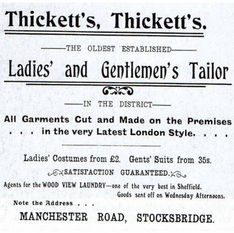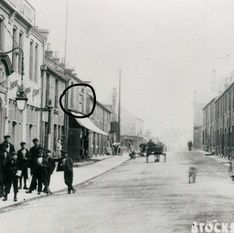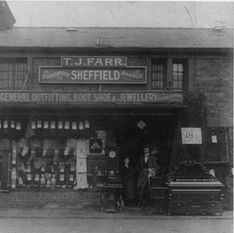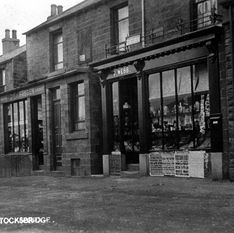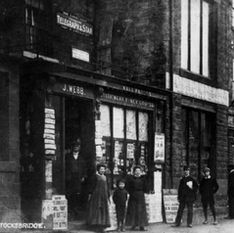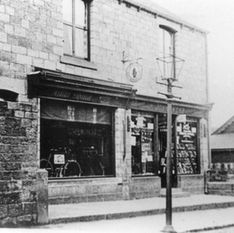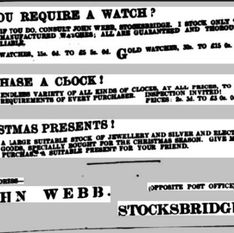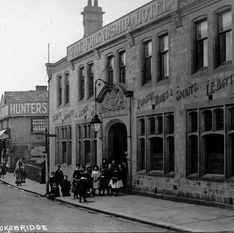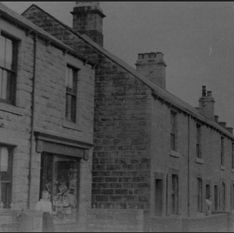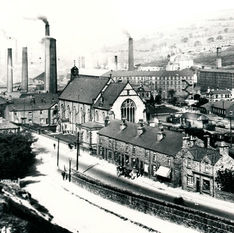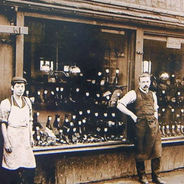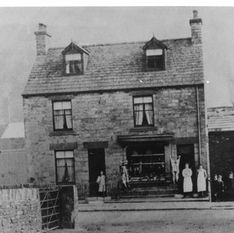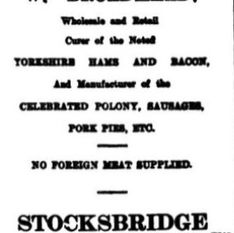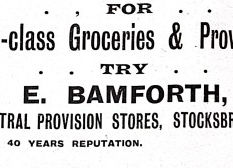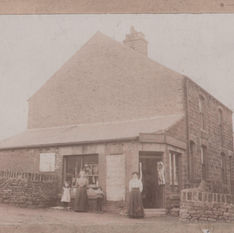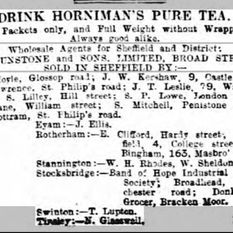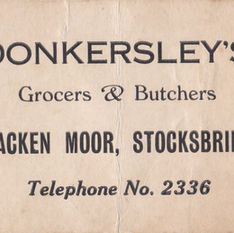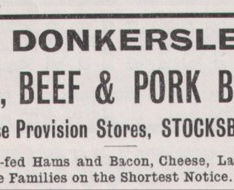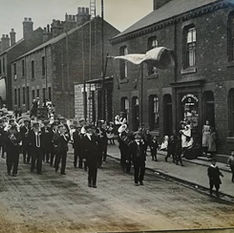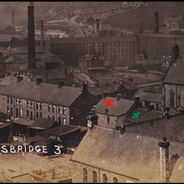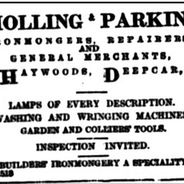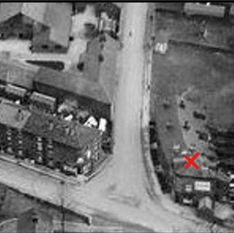Christmas Shopping
1900
Take a walk down Manchester Road from Stocksbridge to Deepcar and see what's on offer

This is based on an article which appeared in the Penistone, Stocksbridge and Hoyland Express 21 December 1900, p8
Quoted text is in italics and advertisements are as close to 1900 as I can find them. Clicking on the photographs will give more information but I'm afraid I am having trouble getting the text to fit when photos are viewed on a mobile phone.
Stocksbridge Shop Windows
Christmas Displays and Decorations
“Manchester Road, Stocksbridge, where at the present time a much more attractive appearance than is usually the case, and a perambulation of that important thorough [fare] is rendered more enjoyable, but rather difficult, on account of the very nice appearance of the shop windows of the various tradesmen, who have vied with each other as to who could show their Xmas goods to the best advantage. One often hears and reads of the need to take care of your pocket, though this warning is generally given on account of pickpockets. In this case, however, it is necessary to beware lest the charming influence brought to bear upon the eyes prove too powerful for the head, and thereby empties the pocket before the bewildered owner has had time to fairly consider the important question of ways and means. Of the substantial things of life, which English people, particularly at this time of year, consider essential, they are to be seen in abundance, and of a quality which would take some surpassing. In addition to edibles, clothing of all kinds is displayed in its most attractive forms.”
GENERAL
E. THICKETT
“While, as regards the articles one could buy in the way of Christmas presents, the choice is so large and varied as to leave the intending purchaser in considerable doubt as to what would be the most suitable article to invest in. in this direction, MRS. E. THICKETT, draper and ladies’ and gent’s outfitter, may be said to take the lead, that lady having given her windows up to a special show of Christmas presents. She has succeeded in drawing more attention to her windows than, probably, anyone else in the district. One window is devoted to children’s toys, and dolls, to cheer the hearts of little girls, can be obtained from a penny to something nearly approaching a pound. Boys can be made happy with engines, musical instruments, and mechanical toys, too numerous to mention. On the other side, Christmas presents can be chosen from ladies’ gloves, gent’s ties, pictures, bronzes, artificial flowers, music cases, Dorothy bags, Christmas cards, scents, and a host of other goods, all of which have been displayed to great advantage, for in point of artistic arrangement and display of colour, Mrs. Thickett has proved to be most adept.”
MRS. BLACKBURN
“Further down the road, MRS. BLACKBURN has decked out her windows in a most neat fashion, and has chiefly concerned herself with showing children’s garments, in which that lady has shown both taste and good judgement, and made a fair bid for popular support this Christmas-time.”
F. RICKETT
“RICKETTS have also confined themselves to showing articles generally required by ladies and gentlemen, and have a good display of umbrellas, ties, collars, hats, bonnets, and many other useful articles. All the windows have been dressed with artistic care, and are worthy of more than a passing glance.”
CO-OPERATIVE STORES
Crossing the road and venturing back towards Stocksbridge centre, next up is the Co-operative Stores.
“In the drapery department at the Stores special lines in Xmas presents are to be seen, and the windows are nicely arranged, so far as space permits. Customers here, however, don’t need much attraction, as they generally walk in and ask for the article they require.”
HARRY CROSBY
“In other departments, a varied assortment of serviceable articles, suitable for Xmas presents, is to be found in the windows of H. Crosby.” A similar article of 1901 says he sold suits for men and boys, boots, blankets and sheets, gold and silver jewellery, china and bric-a-brac. Harry Crosby was a pawnbroker and outfitter who also had a shop in Sheffield. He lived in Rotherham and employed a manager at Stocksbridge called Harry Oliver. The 1901 article places the shop between Mrs. Thickett’s and John Webb’s.
THOMAS JOSEPH FARR
“T. J. Farr has got up one of his windows with a special line in boots and shoes, and his new showroom is stocked with an assortment of carpets and furniture, which is sure to draw the attention of the public.”
T.J. Farr was a pawnbroker and clothier, and later an auctioneer, who also had a shop in Sheffield. He called this store the “The Busy Bee Stores.” Their newspaper advertisements boasted that they sold the largest and best variety of boots and shoes of all kinds; hobnailed, work, walking, school and dancing.
“Do not fail to inspect Farr’s show windows, where you will see all the above special lines in boots and shoes,” they said. It seems they sold just about everything; bedroom tables, dressing tables, washstands, clocks, arm chairs, rocking chairs, wardrobes, overmantels, chimney glasses, bedsteads, mattresses, sewing machines, cruets, biscuit barrels, toast racks, cutlery, wedding rings, jewellery, curtain poles, hearth rugs, wooden steps (“well-made”), carpets, kitchen chairs, wringing machines (mangles), linoleum, fenders and tea services. And probably a kitchen sink too.
They said about themselves: “It is a well-known fact that T. J. Farr keeps the largest and best stock of men’s and boys’ cord and mole trousers and vests. This department has been and always will be a special feature with us, from the weaving loom to the finished article, everything is of the best.”
JAMES WEBB – Post Office
“At the Post Office Mr. James Webb has a capital selection of fancy articles; Dolls in every variety, and toys of every description, likely to attract the attention of parents desirous of giving the youngsters a Christmas treat. One window is devoted principally to vases and articles of like nature, of which a splendid collection is on view.” James Webb was born in about 1847. He was one of Fox’s workers who went to Amiens, France, where he stayed for twenty years. He spent a similar period as the postmaster in Stocksbridge and died in 1921 just short of his 74th birthday. As well as being a postmaster he also sold newspapers, wallpaper and fancy goods. The previous postmaster was Joseph Hepworth.
JOHN WEBB
“John Webb, watchmaker and jeweller, has on view an admirable collection of gold and silver watches and chains, eminently suitable for presents. He has also diamond and other rings, bronze and brass figures, clocks of every description, and a lot of other articles, both useful and ornamental, all of which would come in very nicely for Christmas presents.”
Crossing the road again we come to John Webb’s shop. John was a watchmaker and jeweller and this building was erected in 1900, the year he married his wife Thirza Alice Naylor.
OTHER SHOPS
“Among the other shops, all of which are making special decorations and efforts for the season, may be enumerated Trueman’s, Seeley’s, E. Noble, G. Depledge, A. Herbert, Williamson’s, E. Jackson, J. Faulkner, and H. Spooner. All these are catering principally for the youngsters – with one or two exceptions – and well right are they doing it, indeed it is rather doubtful whether any of the young folks of the neighbourhood will have sufficient cash to last the holidays through, so many and varied are the ways open to them to get rid of their surplus coppers.”
TRUMAN
There was only one Truman family in the district when the 1901 census was taken. Joseph Truman was a coalminer and grocer living at Horner House. It would have been his wife Mary who ran the shop. Both Joseph and Mary had been born in Staffordshire. In later years David Truman, who was a local Councillor, had a beer-off shop in Station Road, Deepcar.
SEELEY
The only Seeley family in the district in 1901 was the household of Frederick Seeley, who had been born in Suffolk. The shop was probably at Horner Houses and would have been run by his wife Sarah Ann, Frederick being employed in the steelworks. His descendants had no idea that the family had a shop, and we have not been able to ascertain exactly where it was.
DEPLEDGE
Again, there was only one Depledge family living locally in 1901. George Depledge was recorded as being a grocer when the census was taken. He died in 1904 and his wife took over the running of the shop for a while; she was recorded in White's Directory of 1905 as a shopkeeper and beer retailer. The shop was in the vicinity of the Friendship Hotel and Johnson Street.
WILLIAMSON'S
The only Williamson in Stocksbridge in 1901 was Hannah Williamson who had been born in Askern, Doncaster. She was 68 years old and was the widow of Keyworth Williamson. It seems likely that her shop was on the corner of Manchester Road and Victoria Street. She moved to Horner House to live with her son Thomas Firth between 1905 and 1911, and died in September 1911. After Hannah left, this shop was run as a grocers by a lady known as “Granny Bodsworth.” She was the widow of Harry Bodsworth, a greengrocer and carrier, and they previously lived at Chapel Row opposite the Coach and Horses Inn. Harry used to go to Sheffield with his pony and dray to fetch his green grocery from the wholesale market. As public houses back then were open from 5.30am, Harry was often drunk before most people were up in the morning. This happened so often that his pony seemed to sense he was asleep, and used to make its own way back to Stocksbridge with its sleeping passenger, right up to the shop door. In 1902 he was fined 5 shillings for having no control over a horse and dray, this time at 8.35pm.

AMELIA HERBERT
Amelia Herbert ran a shop from her house which adjoined the Friendship Hotel Her husband Joseph had died in 1895. He was recorded as an invalid on the 1891 census and had previously been an engine tenter (stationary engine). Amelia's son James Randal Herbert later ran the shop, although his occupation was always recorded as engineer. Randal lived in this house next to the Friendship Hotel from until at least 1939, a period of over 58 years. There was another shop run by an A. Herbert at this time, in Deepcar. This was at 152 Manchester Road, Deepcar and was a drapery, also selling fancy chocolates, sweets, tobacco and cigarettes.
EMMA NOBLE
Emma Noble’s shop was in a house known as “Hope House”. Noble’s later became Heeley’s shoe shop, Hope House coffee shop, Garretty's Restaurant and is now Spice Valley Balti. It was next door to Thickett’s shop. The 1901 census records Emma Noble as a single lady aged 50, living with her son Thornton Noble.
ERNEST JACKSON
A bit further along the main road towards Deepcar was Ernest Jackson's greengrocer's shop on the end of Rimington Row. Ernest was also a local fireman; he joined the fire brigade, who were all volunteers, in 1895, and was made Captain in 1912.
J. FAULKNER
I have to admit I am not sure about this one. The author of the newspaper article has dealt exclusively with shops on the main road, but I cannot find any J. Faulkners living on the main road who had a shop. Of course, they could have rented a lock-up shop and lived elsewhere, or the initial J. could be wrong, or perhaps the name of another family member who had since died. There was a J. Faulkner living at 78 Haywoods Park who was a “confectioner shopkeeper” at the time of the 1901 census. Joseph had been born in Lutterworth in around 1835 and in 1881 he was living at 78 Haywoods Park and working as a shoemaker. He worked for the Co-operative Society as a grocer's assistant from around this time until 1894.
Joseph had moved to Deepcar between 1874 and 1877. A Trade Directory for 1901 records Joseph as a confectioner, tobacconist and stationer. He died in 1903.
There was a shop on the main road belonging to a Frank Faulkner, but I don't know who this was. Joseph did have a grandson named Frank Faulkner, born in 1881, but he became a baker, first in Sheffield and later in Doncaster and Bradford. Frank's shop did not have an entry in White's 1901 or 1905 Trade Directory but he did place an advert in the 1908 Stocksbridge Almanac which tells us that he sold paintings, water colours, sweets, chocolates, tobacco, cigars, mantles, glasses and forks. The address was 151 Manchester Road, which I don’t think exists today.
B. SPOONER
Mistakenly written as H. Spooner, this was actually Benjamin Spooner. Benjamin is listed as a shopkeeper in the White's Directories on 1901 and 1905 although the census records him as a coal miner. As was usually the case with small shops, his wife Mary would have taken charge of the running of the shop, which appears just before the entry for Gibson Lane in the 1901 census schedules. After he retired from mining he set up a waggonette and coal leading business until failing health forced him to give up work, in about 1905. He was just 50 years old when he died, leaving a widow and two sons, Bernard and Horace.
THOMAS BRAMWELL
“T. Bramwell, boot and shoe maker, is showing a grand assortment of boots and shoes, quite worthy of his well-known reputation, and his leading lines for Christmas are dress shoes and fancy slippers, in addition to which he is showing his usual good display of ordinary wear, for which he has a well-known character in Stocksbridge and the surrounding district.”
Looking at where the shop appears on the 1901 census, it seemed to be between the Friendship Hotel and Farmer's Terrace, perhaps down the side of where Hunter’s shop (later Smith Wilkinson’s) was. Of course, the census enumerator might not have gone in strict order, for a similar Christmas article of 1901 places Bramwell's firmly in the position of the first photograph below, next to Webb's jewellers and across from Webb's post office. There was a shoe shop here for many years - Instep Shoes and Tandem Shoes, before the Happy Days card shop opened.
FOOD SHOPPING
WILLIE BROADHEAD
“Coming to articles of food. Stocksbridge can fully be said to have been catered for in a fashion which leaves no loophole for the least little grumble imaginable. W. Broadhead, beef and pork butcher, has on show a splendid heifer, fed by A. Bingley, Esq., of Whiteley Hall, Ecclesfield, and some grand porkers, while he makes a special show of home-cured hams, for which he is noted throughout the district, and also makes a leading feature of pork and mince pies. He is also showing some grand mutton, his show in all classes of goods being quite equal to his past reputation for excellent quality, and is sure to draw custom.”
Broadhead's shop was on the main road at the bottom of Hole House Lane, and the building now houses a hairdresser and barber.
SYDNEY HAGUE
“Sydney Hague, butcher and grocer, has on view a grand assortment of beef, mutton, and pork, all of which has been well fed and shown up well, he is also making a special line of turkeys, geese, and poultry, of which he has obtained a big consignment. Altogether a most attractive show.”
Sydney was the son of Alfred Hague, also a butcher and grocer. His shop appears to have been on the corner of Johnson Street and Manchester Road, according to how it was recorded in the 1901 census, so it’s likely it was either in the building marked W. Hoyle in the photograph below, or the house on the opposite corner.
Earlier in the year, in August, Sydney treated his customers to an outing to Dunford. Enough people went to fill three waggonettes. The weather was fine and an enjoyable afternoon was spent there.
WILLIAM SCHOFIELD at the Co-op
“W. Schofield, at the Co-operative Stores, has on view bullocks, fed by the Hon. James Lowther, M.P., bred at Wilton Castle, beef fed by the Earl of Leinster. In mutton he has obtained two sheep, Hampshire Down, which obtained first prize at the Rotherham Fat Stock Show, and one, Wensley Dale, fed by W. B. Foers and Sons, which took the first prize for best sheep at the above show. In pork W. Schofield has obtained some prime stuff, having been supplied, among others, by the following local feeders:- Messrs. Newton, Whittaker, Laycock, Illingsworth, Poole, Crossland (Hunshelf), and Webster (Bolsterstone). Pork and mince pies are a leading line at the Co-operative Stores at Christmas time, and a special bid is being made for custom in the butchering department this year by Mr. Schofield.”
Mr. Schofield worked for the Co-op from 1880 until 1905. Writing in his book, the History of the Stocksbridge Bank of Hope Co-operative Society, in 1910, Joseph Kenworthy wrote that William “gave of his best, and as co-operators we were not unmindful of the warmth such lives diffuse throughout a movement whose members are apt to grow cold and unfeeling when they kneel too long at the shrine of dividend. Co-operation will surely die if it seeks to live by bread alone.”
EDWIN BAMFORTH
“E. Bamford [sic], butcher and grocer, has on show some very good beef, but his special line is poultry, bred by himself, he being one of the largest breeders in the neighbourhood. He is also making a capital show of Christmas fruit, of a quality and price which has already drawn a large amount of custom, and bids fair to show the way to other dealers in these commodities.
Alfred Hague, butcher and cheese” merchant, has on view a heifer, fed specially for his Christmas trade, by Cockayne and Sons, at Sheffield Paddocks, and a heifer, fed specially by P. J. Hudson, Esq., of Yew Trees, Bolsterstone, together with some grand South Down mutton. In cheese he has a capital show of Cheshires from leading dairies, and some prime American cheese. He has altogether a first-class show in every branch.”
Edwin Bamforth and his wife Bithia had a shop on the corner of Smithy Hill and Manchester Road near the Coach and Horses Inn. He had been born in Holmfirth in about 1845 and he married Bithia Evans in 1866. In 1871 they had a shop at Deepcar, perhaps in the row opposite the King and Miller, or very close by. He moved to the Stocksbridge site at some point before 1881, and was there for decades until he and Bithia moved to run a “Company House” in Blackpool. Company Houses were lodging houses where guests rented a room or bed and could either buy their own food to be cooked and served in their rooms or in a dining room, or dine out. In 1902 Edwin instructed local auctioneer and valuer John Bramall to sell many of his effects because he had taken a residence in Blackpool. He doesn't seem to have gone permanently because he was still advertising up until at least 1908 (unless his son, also Edwin, took over). He was in Blackpool by 1911. Edwin died in Blackpool in 1920 at the age of 76 and his widow returned to Stocksbridge to live with her son Edwin at Albany Road. She died in 1923 aged 78.
The photos below were taken after 1902, when the Miners’ Welfare, just along from the Coach & Horses, was built. The low-roof extension to the pub was done after 1902 when Smith's brewery acquired the premises and before 1916.
BROOK DONKERSLEY
Donkersley's Butchers & Grocers was at Bracken Moor, on the corner of Victoria Road and Stanley Road. It wasn't included in this newspaper article of 1900, which concentrated on the shops along the main road, but it did appear in a similar article published the following year. I am including it here because it was my great-great grandfather's shop. Brook had been born in Honley in 1851 and was an engineer by trade. He came to work for Samuel Fox and sent his sons to train as butchers with a firm of German pork butchers in Sheffield. He moved to Bracken Moor from a tiny house at Don Square, Horner House after having a pair of semi-detached houses and a lean-to shop built. This would be in around 1893.
The name B. Donkersley appears on a list of the Management Committee of Stocksbridge Band of Hope Industrial Co-operative Society for the years 1885 to 1893. This first date seems to coincide with his move to Stocksbridge, and the latter with the opening of his own shop – perhaps a conflict of interest was the reason why he did not continue with the Co-op. In the same book, a minute dated 16th October 1885 records, “proposed – That Messrs. Donkersley and Willis assist in the Draper’s shop alternate weeks or, as they can arrange. The same remuneration to be given to the above assistants as was paid to Messrs. Leather and Peace.” A later minute of 9th July 1886 proposed that “the Assistance in the Drapery Shop be discontinued for the present.” Joseph Kenworthy thought that the custom of employing “assistance” originated at a time when it was thought necessary to have some check on dishonesty, in addition to its being an economical way of getting help on busy nights. However, this could, he pondered, have been more of a hindrance than a help! He wrote, “It must be confessed, however, that such assistance was often more embarrassing than helpful, as the awkward movements of ‘more thumbs than fingers’ in the handling of lace and other delicate fabrics, whose mysteries are of too esoteric a nature to confide to the general laity, would make confusion worse confounded … [customers would] try to hit upon a night when they might have the draper’s undivided attention.”
The 1901 article reads: B. Donkersley, of Brackenmoor, butcher and provision dealer, has purchased a nice heifer, fed by Mr. P. J. Hudson, of Yew Trees, Bolsterstone. In the pork line Mr. Donkersley has obtained two good specially-fed pigs from Mr. P. J. Hudson, and two fine porkers from Mr. Ellis Grayson of Bitholm House, Deepcar. His stock includes a good supply of first-class hams, bacon, cheese, etc.
OLD HAYWOODS
WILLIAM JAMES JOHNSON
“Here premier honours for a window show must be awarded to W. J. Johnson, bootmaker and clothier, whose windows are very tastefully set out. Not only has he got his usual good assortment of boots, shows, and clothes on view, but these are tastefully ornamented and set off by a good display of basket ware, fans, and other ornaments.”
William James Johnson was a boot and shoe maker living on Manchester Road, Old Haywoods. By 1911 he had moved to new premises at Station Road, Deepcar. His shop was opposite the milestone that is still there today.
WILSON MOORHOUSE
“Wilson Moorhouse, grocer and general provision dealer, is again to the fore with a choice selection of Cheshire cheeses, of which he annually disposes of a huge quantity, but his hams, bacon, and eggs, of which he makes a special show each Christmas, are of the usual good quality. He has also a window devoted to crockery, vases, and goods of a fancy character, which all look very pretty.” Mr. Moorhouse had a grocery shop and beer-off on the main road at Old Haywoods. He had been born in Stocksbridge in 1867 and his wife Ellen had been born in Rochdale. Wilson died in 1923.
BRAMALL'S
“Bramall’s drapery and millinery establishment is very tastefully set out, and will no doubt be largely patronised by the lady residents of Haywoods.” The only Bramalls (and spelling variants) at Old Haywoods when the 1901 census was taken were the auctioneer John Bramall, his wife Ann and their daughter Ada, who was 23 year old. They lived at Leeke House. A 1901 article mentions the shop of “Miss Bramall” so I think it must have been Ada Bramall's shop although it isn't in the 1901 or 1905 Trade Directory for Stocksbridge. “Miss Bramall has a nice window of children’s and ladies’ articles in the drapery and millinery line, and the same may be said of the shop on the opposite side of the road.” John Bramall died in 1904 and in 1907 his widow Ann bought the Castle Inn after her husband’s death, from 1907. Ada married George Leonard Brook Samson in 1909 and they later took over the licence of the Castle Inn.
LEONARD CRAPPER
“L. Crapper, stationer, is showing a good variety of fancy goods, suitable for the season.”
The 1901 census records Leonard Crapper and his wife Harriet at Henholmes. He was working as a carter, and his wife was recorded as a tobacconist and shopkeeper. Leonard had married Harriet Jane Ward in 1899 at Ecclesfield church. They had moved out of the district by the time the 1911 census was taken, to Darnall. Leonard was working as a crucible steel melter. Two children had been born to them, but both had died young.
HOLLING
“Holling, in the hardware department, has on view a good and select choice of lamps, brass pans, copper kettles, and kitchen requisites, all of which are both useful and ornamental.”
The shop in the first photograph did not open until 1901, a year after the newspaper article was published. In 1900 Mr. Holling had premises at “Addy Row” (named for the landlord of the New Inn, Joseph Addy). The Hollings lived in a house called Bank House, at the opposite end of the terraced row from the New Inn, opposite St. Matthias Church. Leonard ran a coal business, and his stables and coal yard were at the back of the row, next to Harry Gaunt’s stabling. In March 1899 Stocksbridge Council passed Leonard's plans for a house and shop at Old Haywoods. He was married to Mary Hannah Parkin and he was the father of John Parkin Holling (born in 1901), who wrote his memoirs in 1959/60.
It was possibly Holling who had a shop at Haywoods called Holling & Parkin, and it could perhaps have been a joint venture between Leonard and one of his wife's family, although I have been unable to confirm this. The shop was an ironmongers and general merchants. In 1899 John Bramall auctioned off a lot of their surplus plant, including three horses, although they continued to advertise until 1902.
An advert from 1899 states: Dealers in all kinds of domestic machinery. Wringing machines, sewing machines etc. Patent washing machines kept in stock. Repairs done on the premises to all kinds of domestic machinery and utensils. Wringing machine rollers turned on the premises. Customers from a distance are requested to note that we pay carriage on all rollers sent to us for renewal. Sycamore or Luignum Vits. Of the best quality, supplied as per orders. [lignum vitae, another name for guaiacum, an evergreen tree at one time used for its hard, heavy, oily timber]. Furniture of every description, quality and pattern supplied to order.
DEEPCAR
CO-OPERATIVE STORES
“Here the Stores hold the sway, and all the departments have made extra efforts in their window shows, and are well to the front both in the butchers, drapery, and grocery departments.” The Deepcar branch was built in 1893, next to the King and Miller. It has now been converted into apartments.
STAFFORD
“The Stafford Boot and Clothing Store have on view a good show of articles in both departments, which are likely to prove very attractive to the residents of Deepcar.” The only Stafford locally in 1901 was a blacksmith living on Hunshelf Bank. I cannot find anything out about this one; it is possible their boots and clothes were sold in the Co-op. There was no entry for Staffords in the White’s Directories of 1901, 1905 and 1911. The nearest I can find in the newspapers is an advert in 1899 for The Stafford Boot & Shoe Warehouse, which was at Market Place, Chapeltown and 22 Meadow Hall. Perhaps they supplied other shops?
JOHN FRANCIS HELLIWELL
“J. F. Helliwell, butcher, grocer, wine and spirit merchant, has on show a good variety of articles in each line, but his special window decoration is in the wine and spirit trade.” Helliwell's shop, the Central Supply Stores, was on he corner of Station Road and Wortley Road, so our intrepid reporter has ventured off Manchester Road here. An advert from 1898 tells us that he sold (wholesale & retail): British & foreign wines and spirits, port, sherry, Irish Whiskey, Scotch, gin, Champagne and burgundy. Also hams, home-fed bacon, Danish butter and cheese. He also dealt in explosives for quarry owners and miners – compressed powder, blasting gelignite, dynamite, detonators, various fuses including electric fuses, and so on. He also sold gun cartridges.

